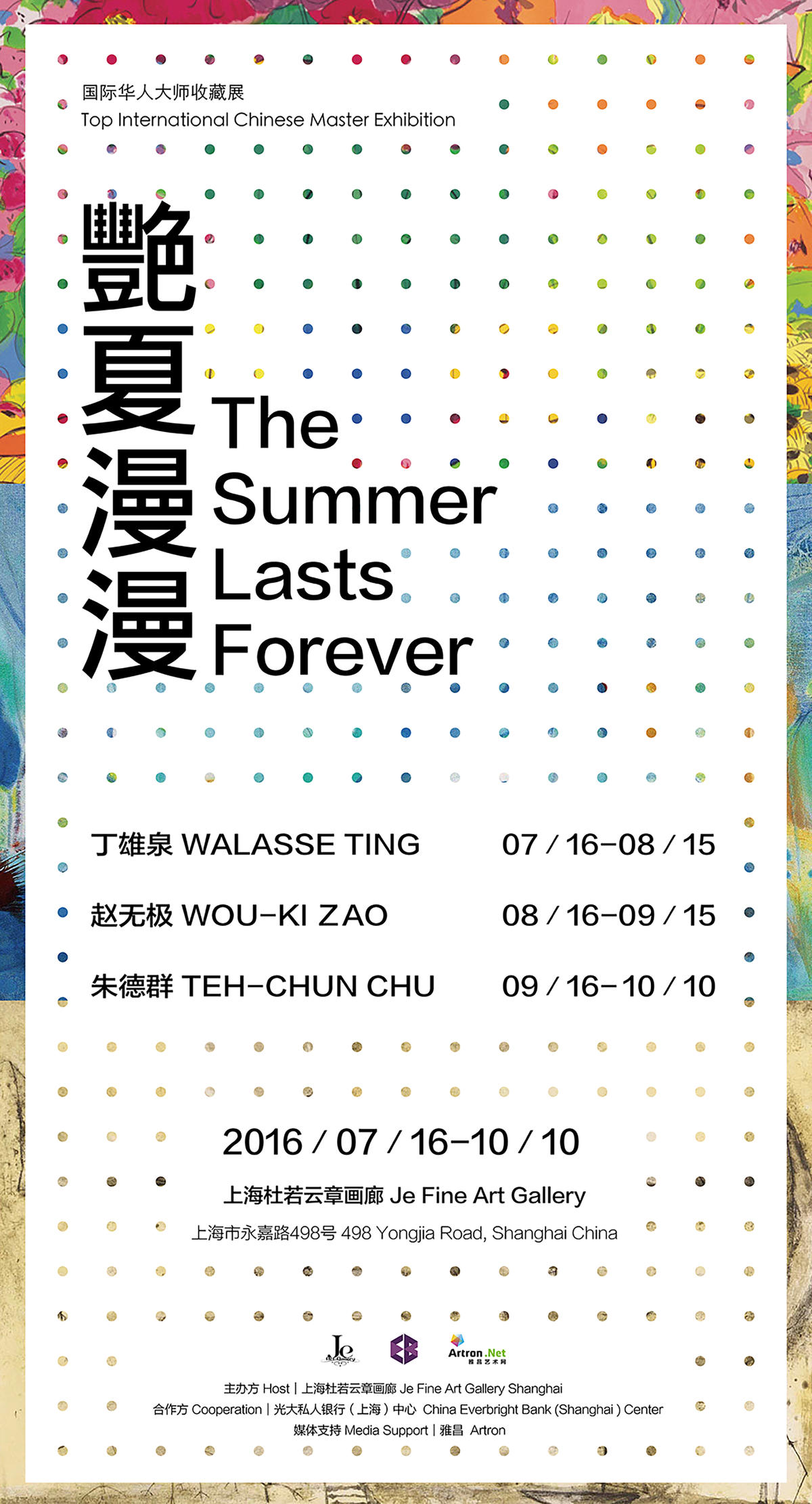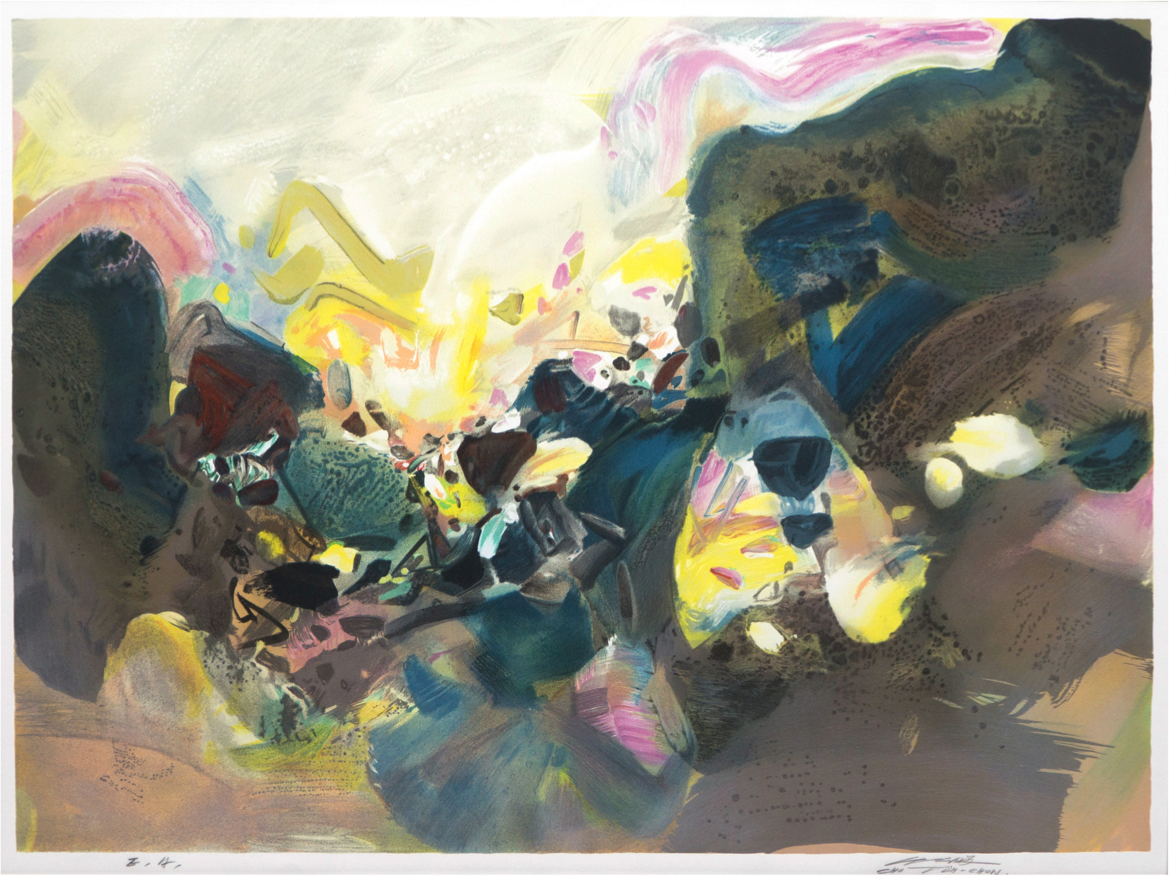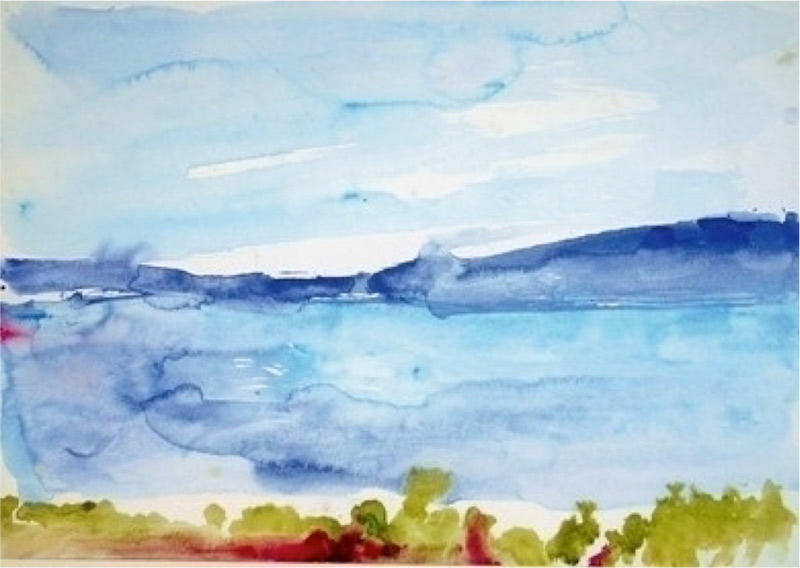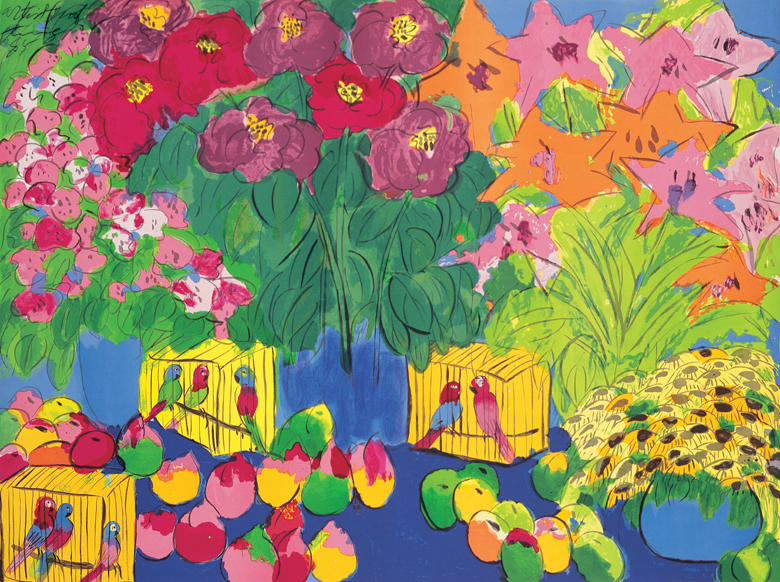艷夏漫漫 The Summer Lasts Forever
艷夏漫漫 The Summer Lasts Forever

第一主展场 丁雄泉 7月16日-8月15日
第二主展场 赵无极 8月16日-9月15日
第三主展场 朱德群 9月16日-10月10日
展 期 Date | 2016.07.16 – 2016.10.10
时 间 Hours|11am -18pm 周一闭馆 Monday Closed
地 点 Address |上海杜若云章画廊 Je Fine Art Gallery Shanghai
上海永嘉路498号 498 Yongjia Road,Shanghai
入场费Admission | 25 RMB(周二-周五) 30 RMB(周末) 会员免费 Members Free
文 | Gwen (Je Young Professionals)
朱德群、赵无极、丁雄泉这三位享誉全球的华裔艺术家,皆有移居法国的经历,是与毕加索、米罗、马蒂斯以朋友相称、出现在同一个画展上的世界级大师。上世纪50年代前后,他们带着一种可谓"叛逆"的心情来到当时的艺术之都巴黎,成为艺术界探索"中西合璧"的先驱。正是在异国他乡,在西方现代绘画的肆意洒脱中,他们发掘了中国水墨的无限可能和东方意蕴的无穷魅力。

在朱德群看来,西方现代艺术家所热衷的"抽象",是中国传统水墨画所本有的精神,只不过从未说出"抽象"二字。他所欣赏的宋代画家范宽曾说过"与其师于人者,未若师之物,与其师之物,未若师于心",正是中国传统绘画"写意"远大于"写实"的表述。有形于无形,无形为有形,从本次展出的朱德群先生的作品中,便可看到或深沉或绚烂的色块与流水般的线条融为一体,混沌中透出神秘玄妙的耀眼之光。

赵无极被称为"西方现代抒情抽象派代表画家",他本人也强调"心灵与画面共呼吸"。早年在"中国传统绘画多半是死的东西"的念头下他来到巴黎,看到西方大师们诸如梵高、布歇、马蒂斯等的画作中对东方世界的神奇想象,却往往停于表象的理解,令他反思起传统的东方艺术哲学:清晰的书法笔触、或深或浅的墨色、留白和构图这些视觉元素,都是为了在他的亦抽象亦具像的作品画面中,传达一种天人合一、虚静忘我的精神境界。

丁雄泉本人并不认为自己属于任何一个画派,也拒绝接受类似的标签。他的这种自由精神驱使他远渡海外,寻找广阔艺术世界,同样也在他的作品之中淋漓尽致。油画、压克力颜料、粉彩、以及水墨,都在他的创作范围;他颇具代表性的鲜艳亮丽的荧光色彩,并不受水墨线条勾勒的轮廓所束缚,随意泼洒,描绘裸女、鲜花等题材,真真是东西方艺术最直白、最具戏剧性的一种表现。
红酒与杜康,东西异源,风味不同,然皆醇香。经过时间的沉淀,朱德群、赵无极、丁雄泉这三位艺术大师的作品,想必正如那美酒,引人细细品味。
Zhu Dequn, Zhao Wuji, Ding Xiongquan are three internationally celebrated ethnic Chinese artists whose works were exhibited along side big names such as Picasso, Milo and Matisse; not only that, they are also personal friends with them. Around 1950s, they went to Paris, at that time the center of arts in the world, with a rebellious heart, searching for the freedom embodied in western arts. In foreign lands far away from home, they turned out to discover the infinite possibilities of Chinese ink painting and the charm of eastern wisdom.
From Zhu Dequn’s perspective, the notion of ‘abstraction’ that western contemporary artists are passionate about is actually the essence of traditional Chinese ink painting. Fan Kuan, a painter of Song dynasty, expressed the idea that the portrayal of spirit is over the portrayal of reality in traditional Chinese ink painting, and he said:" Learning from the universe rather than other people. looking into oneself rather than looking outside." Zhu Dequn’s works shift from darkness to lightness with fluid lines and therefore creates an overall harmony from a chaotic and abstract vision.
Zhao Wuji is named as the ‘Representative of Western contemporary lyrical abstractionism’. He emphasized ‘my picture should breath together with my heart’. In early years, Zhao claimed that ‘traditional Chinese arts are mostly dead and stiff’, and with that in mind, he came to Paris to see all western masters such as Van Gogh , Francois Boucher, and Henri Matisse. However, he realized that the representation of eastern elements in those western artworks only floats on the surface; in other words it did not consider the profound meaning within a painting. He then rediscovered Chinese philosophy in his art. Visual elements such as Chinese calligraphy, dark and light ink, the composition of traditional Chinese landscape, all contribute to deliver the idea of ‘the universe and people are all existed simultaneously’ in his abstract and concentrate works.
Ding Xiongquan refused to categorize himself as a member of any school. This free spirit of his not only drove him to travel abroad for broader world of artistic inspiration but also shows in his artworks. Oil paintings, acrylic paintings, watercolor and ink all serve as media for his creation. His signature use of bright fluorescence colors is not constrained by the ink outline typically appears in traditional Chinese paintings, portraying subjects such as female nudes and flowers. His paintings, all in all, can be viewed as a most straightforward and dramatic representation of combination of western and eastern arts
The masterpieces of Zhu Dequn, Zhao Wuji and Ding Xiongquan are like good wine made of both western and eastern ingredients. After the ferment of time, they call for good savoring.
